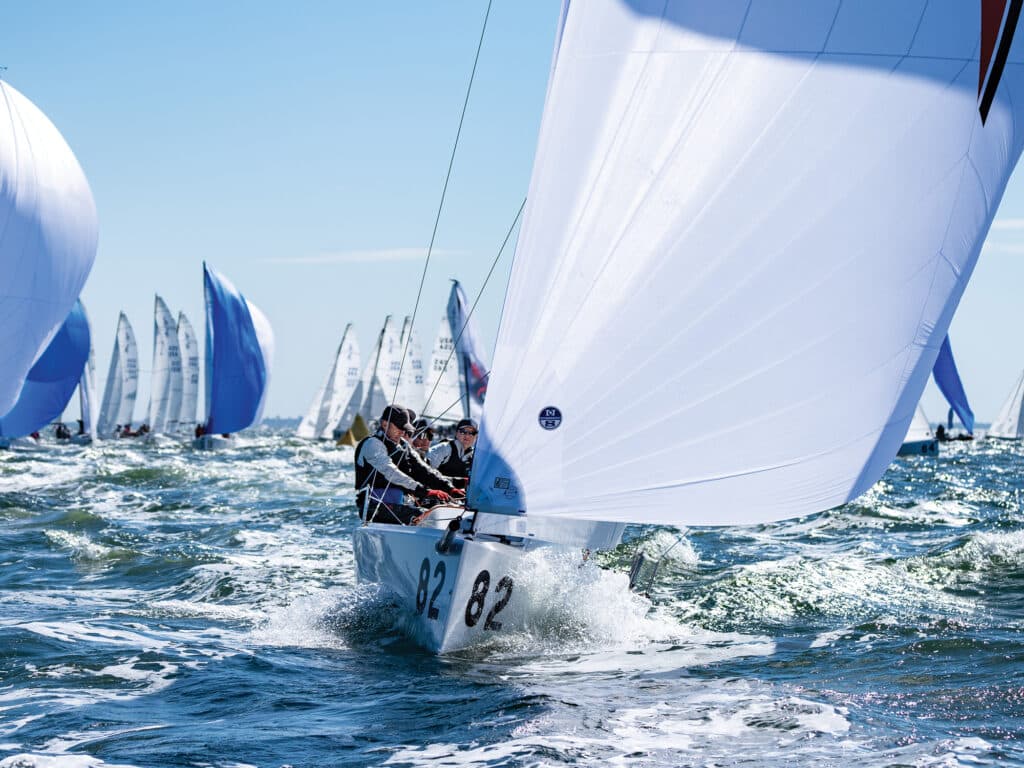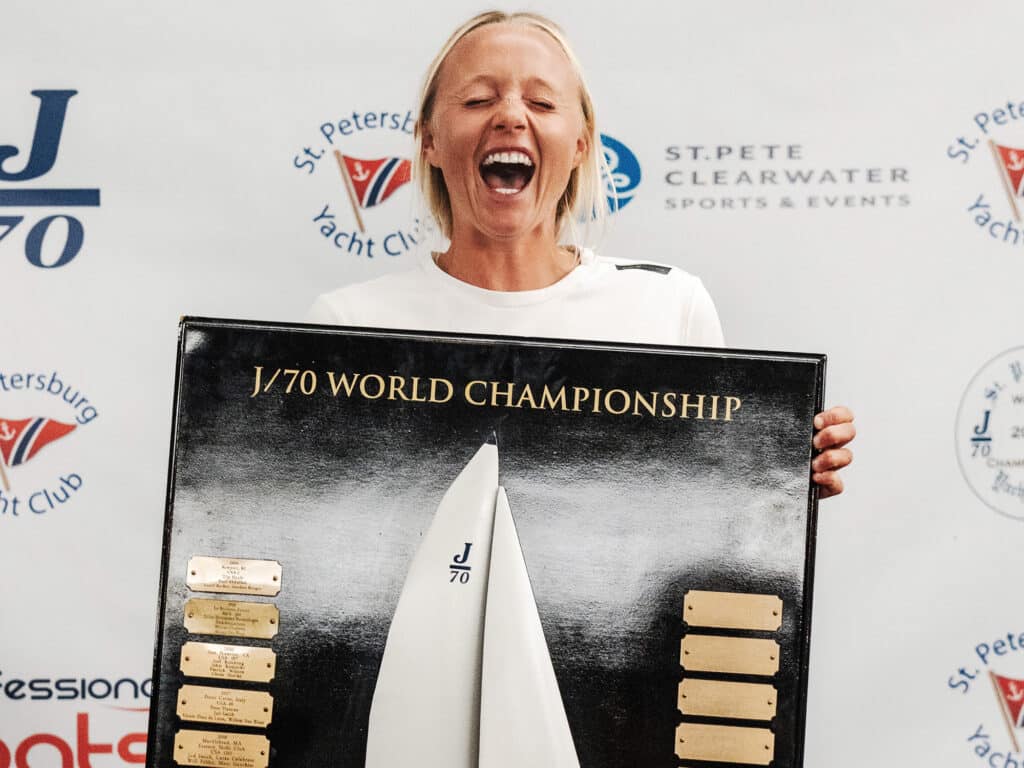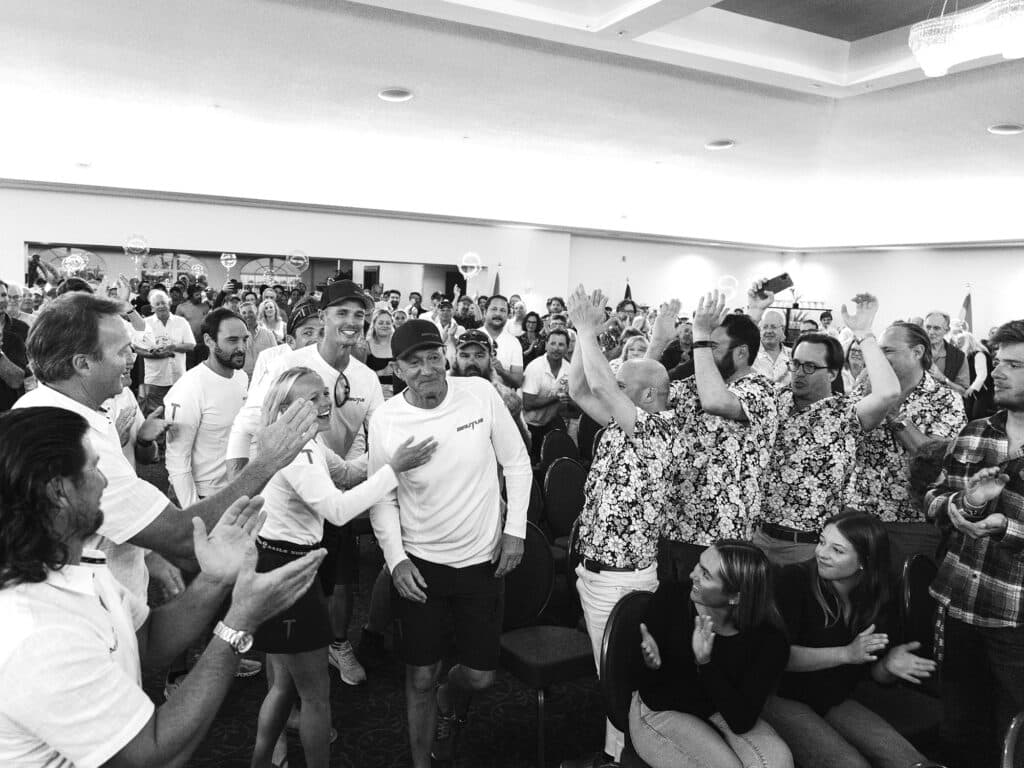
The five-minute horn sounds as the J/70 class flag goes up. It’s shake-and-bake time for the team on Brutus III. I deliver my signature bony-knuckle fist bumps to my teammates, a tradition I brought to them as the only American on board. We do it before every race to loosen up and get excited. It’s Day One of the 2023 J/70 World Championships in St. Petersburg, Florida, and “No Windersburg,” as we like to call it, is living up to its reputation. The forecast is set to improve as the day goes on, but we all know that this first light-air race will reveal who has what it takes to win the world title.
We’ve been preparing for these conditions all year thanks to Mother Nature delivering light winds at several events at Davis Islands, Miami, the UK, and typically windy Lake Garda. All of our light-air training and racing has taught us several lessons: patience, clear communication, coordination moving around the boat, and important feedback loops. Most importantly, we’ve learned to trust in one another, and to do our jobs and do them well. While there might be literal stepping on toes on our boat as we sail five-up, there is no overstepping our individual roles. We own our positions and back up one another whenever necessary. We all bring different but complementary skills, and we use those to work as equals—a true team mentality.
As the final gun sounds for the first race, our focus is simple: sail normally, which is easier said than done in an 83-boat fleet full of talented teams. But nothing is ever normal in the first race of a big-fleet world championship. Thanks to our practice and preparation, we have a decent start and good boatspeed off the line. This was a major goal for our team, and we knew that good, clean starts would allow us to control our race. But even with our good start, we find ourselves hung out in an unfortunate windshift, which puts us in the chaotic midfleet scrum. It’s daunting and disheartening to see so many boats ahead of us, but it’s a place we’ve been before. We buckle down and get to work, crossing the finish line after what feels like a three-hour race; 53rd is not a Worlds-winning result to start with.
At this point, we know that something needs to change. We need to shake off the nerves, reset, and get after it again. I go below and pass up water bottles and the traditional Brutus-style energy bars: the best chocolate fudge brownies. The discussion while we scarf our sweet treats is to remain positive, and we joke about what a relief it is to have our drop race already out of the way. We all know that we have a long week ahead and anything can happen. We stick to the game plan: Sail normally, do our best, and keep the positive energy at full tilt. Small windshifts make a huge difference on long legs, so we know that we need to keep a particularly close eye on them.

We then go straight back into our normal prestart routine by going head-to-wind near the midline committee boat and determining the side of the line we want to start at. Then we go upwind on starboard and port tacks to get our bearings and check our rig settings. After one more wind check and a back-down to make sure we were free from all the little bits of seagrass we’ve seen on the course, we ping the ends of the line and time our runs to the line.
Again, we’re shaking-and-
baking at the five-minute signal. The breeze is building, the sugar is kicking in, and we are ready to redeem ourselves. And redeem we do, crossing the finish line with a third. We could attribute the brownies as the secret to success, but what really happened is we found our stride.
For the remainder of the week, our best sailing is done when we find ourselves with room to play, and we constantly adjust our technique to even the smallest changes in wind strength. Our trust in one another to change modes easily provides us with opportunities to make big gains both upwind and downwind. Knowing this, our tactician, Ben Saxton, can make confident decisions about what our plan is and utilize the feedback loop of information we constantly have going in the boat.

Our driver, Thomas Mallendine, provides Saxton with how the helm is feeling and what he needs. Chris Grube constantly relays big-picture wind reports, what phase the breeze is in, and how far up and down we are from our mean compass numbers. Downwind, he keeps the communication flowing about how the spinnaker feels, helping Mallendine drive to the mode we need. Charles Thompson, Brutus’ fearless owner, provides feedback on relatives both upwind and downwind, and I call short-term puffs and lulls upwind and downwind. It might seem like a lot of chatter, but we have been able to fine-tune it with practice so that we can make the best decisions while racing without being on information overload.
As a team, we find that if we are overly dialed in, we’re too stiff and don’t execute the boathandling as well. Overcoming that is what makes this team so special. All of the technical information, boathandling, feedback and preparation make us a fast team, but our real magic is our banter. No one on the boat is safe from being lovingly picked on, and nothing diffuses tension faster than making fun of yourself. It’s not constant, but at many points during races, and always between races, we turn to laughter to set us straight. There’s no point in playing if we’re not having a good time.
Before the last race of the regatta, we have a decent overall lead in the standings, but we know we need to sail well to win. It’s still anyone’s game. I am nervous. We all are, but we’ve talked about it. Being nervous is OK—as long as we utilize those nerves and enjoy the privilege of being in a position to be nervous.
Lo and behold, the start of the last race is our worst of the regatta. We’re deep in the third row and about to lose it all. But we harness our nerves differently than we did in the first race: We laugh and move on. We sail fast, make smart decisions, and keep our composure. We sail our way, the Brutus banter in full effect, and it works. This is what makes winning this world championship title so special.
It’s an amazing feeling to win my first world championship, and I am honored to be the first American woman to win the J/70 world title. But the satisfaction is far greater than that. It might sound cliche or sappy, but I’m proud that we won as a team, as best mates, laughing and smiling from start to finish.









